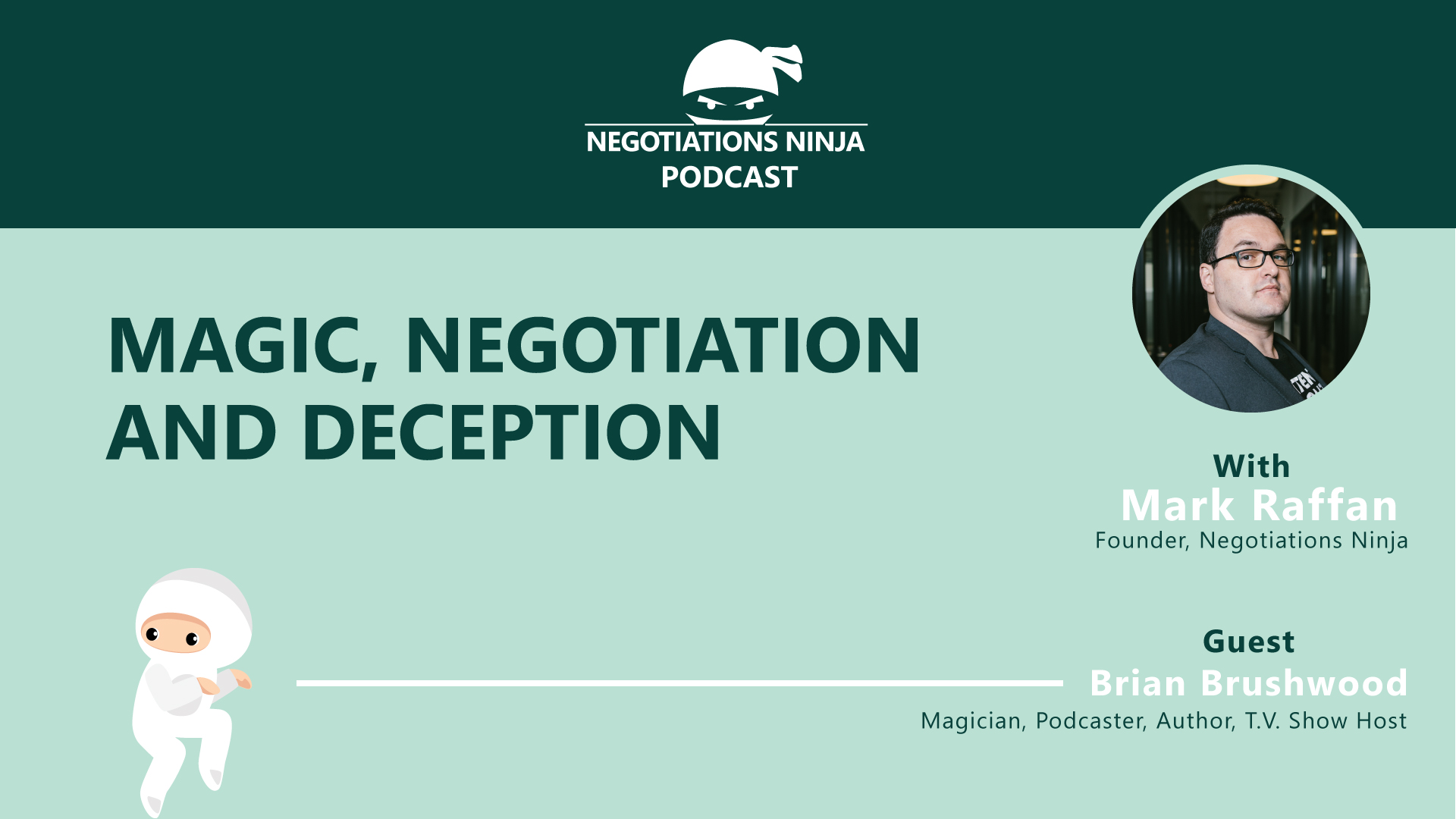I’ve been waiting to have this conversation for a long time. Full confession, I’m a huge magic fan. And one of my favorite acts is a guy named Brian Brushwood. He’s a magician, podcaster, author and television personality. Brian also has a great show called Scam School where he teaches viewers how to use magic to scam beers off of friends in the bar—but for a good reason.
In this episode of Negotiations Ninja, Brian and I have a great discussion about the dark side of magic and negotiations. The unfortunate thing about magic and negotiations is that sometimes it attracts people who would use tricks, communication tools, and body language for nefarious means to deceive others.
How do you recognize people who would try to deceive you and how should you develop your skills to deal with those situations? We know that there are ways to leverage someone’s attention, so how can you use that attention to get more of what you want without deceiving them? Let’s find out.
Outline of This Episode
- [2:00] Learn more about Brian Brushwood
- [3:53] The heart behind Scam School
- [6:42] The different ways to influence and persuade
- [11:31] The unethical ways people use influence
- [20:35] How mentalists elicit information
The different ways to influence and persuade
Brian is a huge fan of Robert Cialdini. Cialdini outlined in his book, “Influence,” numerous proven ways that you can influence people: Liking, reciprocity, commitment, social proof, authority, and scarcity.
People who like someone tend to say yes to them. If someone does something nice for you, you feel the need to reciprocate and balance the scales. If you want free drinks on any flight you’ll ever take, show up with three bags of M&M’s.
Hand them to the flight attendants and say “I know you’re working really hard, so I got each of you a gift” and hand them the M&Ms and you’ll drink free for the rest of the flight. People don’t like owing people, so they reciprocate as soon as possible.
Frank Abagnale could pass obviously bogus checks as long as he was dressed as someone authoritative. He passed over $1 million in bogus checks and traveled around the world by simply dressing as a pilot or surgeon.
There’s also the concept of social proof. Everyone has a compulsion to go along with whatever the crowd is doing.
The unethical ways people use the principles of influence
When Brian was 17, he worked at a movie theater. A guy and a girl came in. The girl went to the far end of the concession counter to distract his coworker. The man talking to Brian asked for change for a poker game later that night. He kept changing his mind about the type of change he wanted for his $100 bill, making Brian repeatedly pass money back and forth.
At the end of the process, it felt like the exchange was fair—but Brian had a sneaking suspicion that he’d been deceived. They counted the til and it was $50 short. Later he learned that the couple had played the “short change” con. You use distraction—and what sounds like sensible math to the casually interested brain—and one party ends up with more money.
Something similar happened to Brian two years later. A street scammer set up a game and while he was doing so, someone walked up excitedly, claiming that he loved the game. The man played the game and won money, trying to entice others to play. Brian played and chose right, which is when the man convinced him to go for double or nothing—and he lost. That was social pressure in play.
How mentalists elicit information
When you go to a movie, you laugh at things that never actually happened and cry about characters that don’t actually exist. When it comes to stage hypnosis, there’s also social pressure because thousands of people are watching. They’ll invite numerous people on the stage and slowly eliminate them until the most compliant individuals are left on the stage.
Is it magic or mentalism? A mentalist is a master chess player. They reveal the rules as the show goes on, which puts them at an advantage. Often, the heavy work is done when it feels like the table is being set. Usually, they make you write something down on a piece of paper. If you don’t, they won’t be able to read your mind. Most people are doing this for entertainment.
But enough people do this that you need to understand the fundamentals. There’s a lot we can learn from magic and mentalism because of the skills these people develop.
Brian is a skeptic at heart and wants others to embrace the same skepticism. He sought to figure out an innocuous way that someone could watch a show and pull off a scam or deception on their friends to get a free beer.
He hoped that by engaging in this practice, they’d learn to recognize deception when they saw it. And the more honest people engage in the act of deception innocuously, the better equipped they’ll be to recognize when they’re being deceived.
The bottom line is that all of these tools can be used for good or bad. Listen to learn more about magic, deception, and the power of influence.
Resources & People Mentioned
- Influence
- The Like Switch
- How to Win Friends and Influence People
- Justin Willman Makes This Guy Think He’s Invisible
- Catch Me if You Can
Connect with Brian Brushwood
- Follow on Twitter
- Scam School
- The Modern Rogue
Connect With Mark
- Follow Negotiations Ninja on Twitter: @NegotiationPod
- Connect with Mark on LinkedIn
- Follow Negotiations Ninja on LinkedIn
- Connect on Instagram: @NegotiationPod




